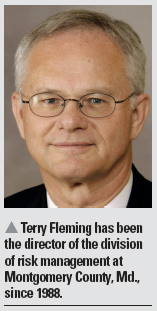 Terry Fleming serves as director for the division of risk management for Montgomery County, Md., and, as of last month, also is the newly elected president of the Risk and Insurance Management Society, Inc. (RIMS). Claims' Eric Gilkey sat down with Fleming to discuss his plan for the organization, the challenges that risk professionals face, fallout from the troubled economy, and how claims can better work with risk professionals.
Terry Fleming serves as director for the division of risk management for Montgomery County, Md., and, as of last month, also is the newly elected president of the Risk and Insurance Management Society, Inc. (RIMS). Claims' Eric Gilkey sat down with Fleming to discuss his plan for the organization, the challenges that risk professionals face, fallout from the troubled economy, and how claims can better work with risk professionals.
How has your position as director of the division of risk management at Montgomery County, Maryland prepared you to take over RIMS?
I have been a RIMS volunteer for over 10 years, serving on committees and in the local chapter before being elected to the board of directors. I have over 25 years experience in risk management in the County and the private sector. My experience at in Maryland has prepared me in many ways to be among the leadership at RIMS. It is a not for profit corporation, and many of the issues are the same for public entities, such as a fiduciary responsibility to the membership (citizens), high ethical standards, the opportunity for public speaking engagements, and advocating on behalf of the goals and objectives of risk managers.
What are some of the biggest challenges you see in the risk management field? How do you plan to address these issues in your new position? Put another way, what goals do you hope to accomplish as president?
I plan to focus on four key areas in the next year. First, given the importance of risk management in business today, risk managers have an opportunity to extend their reach into the highest levels of their organizations. RIMS plans to continue to provide education in enterprise risk management as a strategic concept. Second, since legislation and regulation impact risk managers and their employers, RIMS will continue to advocate for and influence legislation and regulation at the state and federal levels. Third, continuing education and sharing best practices are important elements of risk management programs. RIMS will continue to provide state-of-the-art professional development products for our members. We will also continue to promote our membership to benchmark and peer exchange — an invaluable benefit of being a RIMS member. Lastly, many of the services that RIMS provides to its members have international applicability. I plan to help RIMS capitalize on providing these services to emerging markets. This would apply to domestic companies with international operations, and foreign companies.
How has the economy affected the perceived value of a risk manager?
The troubled economy has focused a bright light on the risk management profession. Some have expressed their opinions that risk managers failed to recognize and mitigate the exposures to losses for the large financial firms that experienced problems or became bankrupt. I believe the consensus now is that the firms either did not listen to the risk managers or relied too heavily on flawed risk models instead of looking at risks enterprise-wide.
One result is that Congress is looking at legislation that would require publicly traded companies to establish a risk management committee that reports to the board of directors. RIMS (among other groups) is working with contacts in the Congress to develop standards and practices for the committees.
In what ways do claims and risk management work well together? In what ways could it be improved?
The relationship must be close. The frequency and severity of claims is essentially the legacy of the success or failure of accident prevention and safety efforts and the recognition and mitigation of exposures to loss. Once a loss occurs and claim professionals are involved, the focus is on financial results and loss mitigation. Risk managers are dependent on knowledgeable claim professionals to investigate claims and make the proper decision on liability or compensability, to properly reserve for the loss and loss adjustment expenses, and to successfully negotiate closure of the files. The financial results of claims have a large impact on actuarial projections for reserves and cash flow for claims.
For my self-insurance program, the claim operation is the frontline for great customer service, fair claim-handling practices, solid reserving policies, prompt handling of files, and litigation support. All of these services are critical to the risk manager. A knowledgeable, customer-oriented claim staff acts as the “face” of the County with our employees and our citizens.
There should be frequent interaction between claims and risk management to discuss claim trends, significant changes in reserves, and problem cases from a customer-service viewpoint. Difficulties can arise if the risk manager is unaware of large reserve changes and is caught by surprise with adverse actuarial results.
Want to continue reading?
Become a Free PropertyCasualty360 Digital Reader
Your access to unlimited PropertyCasualty360 content isn’t changing.
Once you are an ALM digital member, you’ll receive:
- Breaking insurance news and analysis, on-site and via our newsletters and custom alerts
- Weekly Insurance Speak podcast featuring exclusive interviews with industry leaders
- Educational webcasts, white papers, and ebooks from industry thought leaders
- Critical converage of the employee benefits and financial advisory markets on our other ALM sites, BenefitsPRO and ThinkAdvisor
Already have an account? Sign In Now
© 2025 ALM Global, LLC, All Rights Reserved. Request academic re-use from www.copyright.com. All other uses, submit a request to [email protected]. For more information visit Asset & Logo Licensing.








